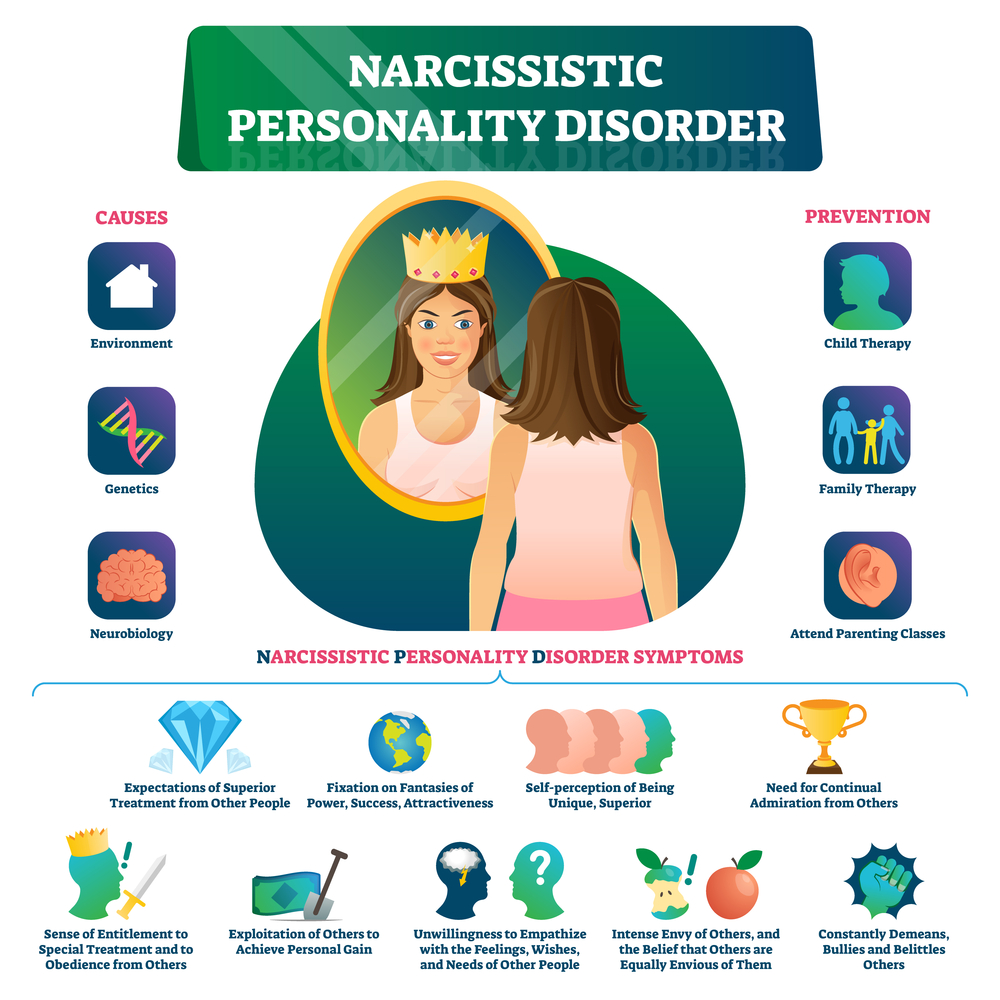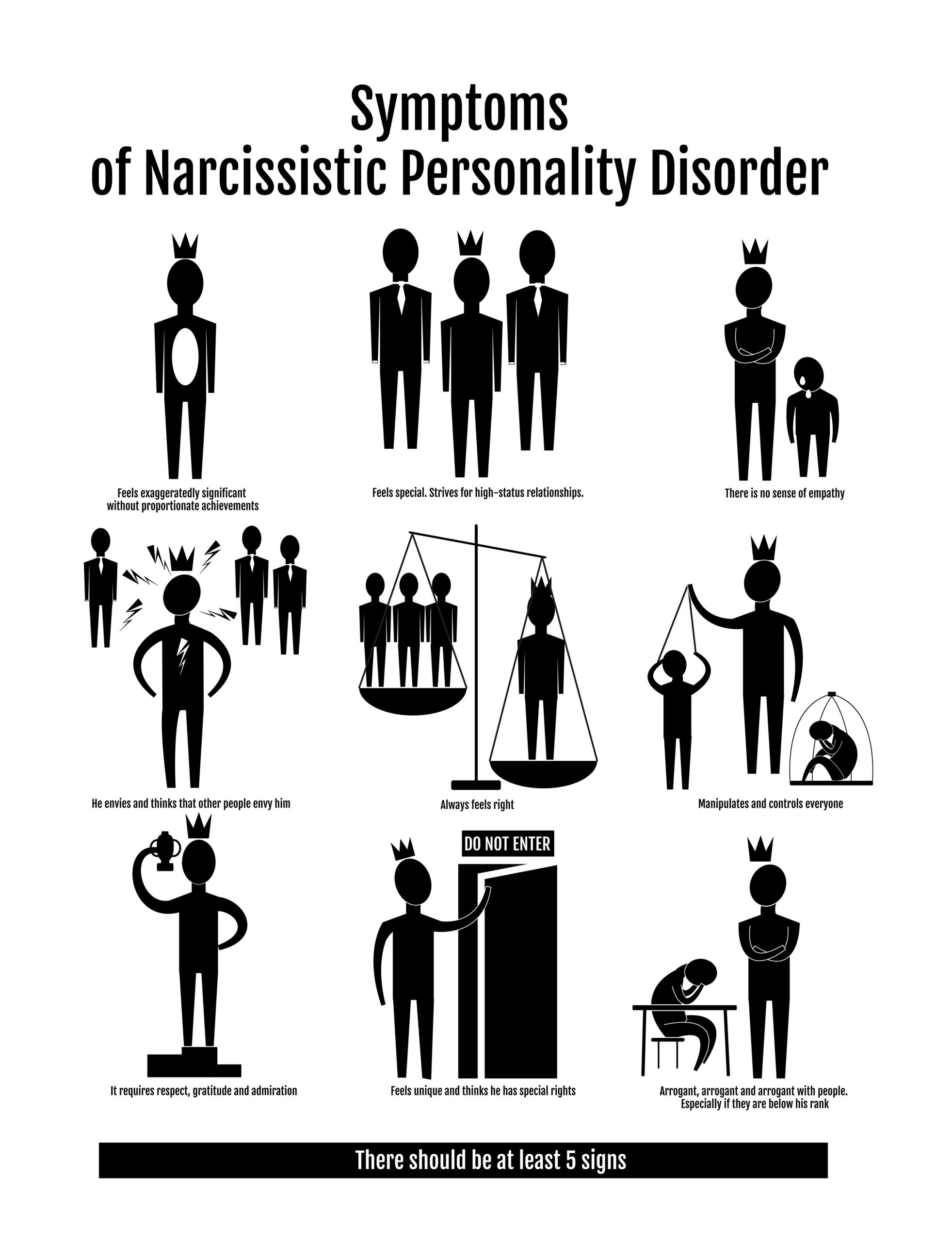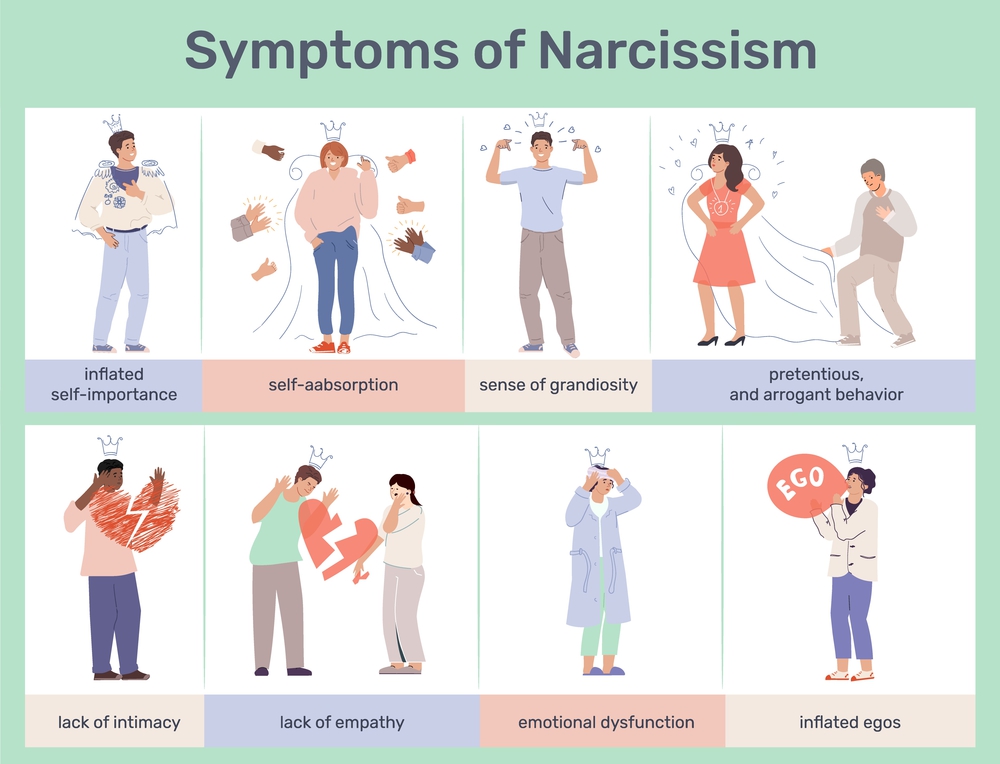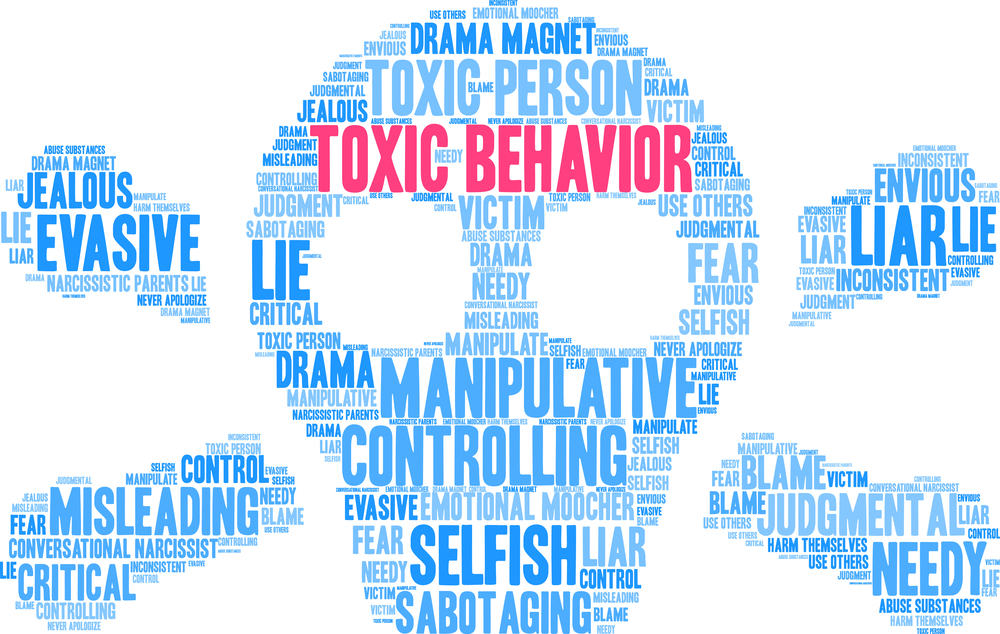Understanding Narcissism in Relationships: The Essential Narcissist Checklist
 Navigating the world of dating and relationships becomes more complex when encountering narcissistic traits. It's important to understand that narcissism exists on a spectrum, with some traits appearing benign or even attractive initially. However, when these traits intensify to form Narcissistic Personality Disorder (NPD), they can significantly impact your romantic life. In dating and relationships, […]
Navigating the world of dating and relationships becomes more complex when encountering narcissistic traits. It's important to understand that narcissism exists on a spectrum, with some traits appearing benign or even attractive initially. However, when these traits intensify to form Narcissistic Personality Disorder (NPD), they can significantly impact your romantic life. In dating and relationships, […]Navigating the world of dating and relationships becomes more complex when encountering narcissistic traits. It's important to understand that narcissism exists on a spectrum, with some traits appearing benign or even attractive initially. However, when these traits intensify to form Narcissistic Personality Disorder (NPD), they can significantly impact your romantic life.
In dating and relationships, spotting narcissistic behaviors early on is critical. This includes recognizing covert narcissistic traits, which might be less apparent but equally impactful. Awareness of these behaviors helps you identify potential red flags in partners or your own behavior.
Understanding the emotional and psychological dynamics of narcissism is vital in protecting yourself from manipulative tactics often employed by narcissists. This knowledge empowers you to make healthier choices in your romantic life and avoid relationships that could harm your well-being.
If you suspect that narcissism is playing a role in your relationship, it’s crucial to explore strategies for addressing these challenges. Whether it’s through seeking professional help, setting boundaries, or understanding more about the nature of narcissism, taking proactive steps is essential for your emotional health.
Key Takeaways:
- Be vigilant in identifying narcissistic traits, as they can profoundly affect romantic relationships.
- Educate yourself about covert narcissism and manipulative behaviors to recognize red flags.
- Seek support and resources to cope with and address narcissistic tendencies in relationships effectively.

Understanding Narcissism
Narcissism refers to a range of personality traits and behaviors characterized by a sense of superiority, a need for admiration, and often a lack of empathy toward others. As you learn more about this condition, you'll be able to recognize the nuanced differences between its manifestations.
Core Characteristics of Narcissism
The hallmark signs of someone with narcissistic tendencies include a pervasive pattern of grandiosity, a constant need for admiration, and a lack of empathy. Consider these defining traits:
- Grandiosity: This is the belief that one is unique or superior. Narcissists often overestimate their abilities and inflate their accomplishments, sometimes to the point of lying.
- Need for Admiration: Narcissists require excessive admiration and attention. Their self-esteem depends on how others perceive them, which can lead to a relentless pursuit of validation.
- Lack of Empathy: There is often a significant deficit in the ability to recognize or sympathize with the feelings and needs of others.
- Sense of Entitlement: Expecting favorable treatment and compliance with their wishes is typical.
- Arrogance: Narcissists can appear disdainful or patronizing.
- Fantasies of Success: They may be preoccupied with dreams of unlimited success, brilliance, beauty, or ideal love.
Key takeaway: Recognizing these core traits can aid you in identifying narcissistic behavior patterns in your interactions.
Contrast Between Covert and Overt Narcissism
Narcissism can be displayed in diverse forms, primarily categorized as covert and overt:
- Overt Narcissist:
- Traits: Overt narcissists are the more obvious, embodying the stereotype of narcissism with blatant self-importance, charisma, and confidence.
- Behavior: Their arrogance and superiority are displayed, often expressed through boastful statements and behaviors.
- Covert Narcissist:
- Traits: Covert narcissists are harder to spot and exhibit narcissism through defensiveness and hypersensitivity.
- Behavior: They may seem introverted or withdrawn and often play the victim to garner admiration and sympathy.
While both types share a common thread of narcissistic personality disorder characteristics, their external behavior and interactions with others differ.
Key takeaway: Understanding these two faces of narcissism can help you navigate relationships with heightened awareness.
 Identifying Narcissistic Behaviors
Identifying Narcissistic Behaviors
When you're trying to spot narcissistic behaviors, know that these traits often show up differently in various settings. Awareness of the signs can empower you in all areas of your life.
In Relationships and Intimacy
In intimate relationships, those exhibiting narcissism will often prioritize their own needs and feelings over yours. They may:
- Demand constant attention and admiration.
- Become jealous or accusatory without cause.
- Undermine your achievements or interests.
Key Takeaway: If you feel consistently overshadowed or belittled by your partner’s needs and accomplishments, it's worth taking a closer look.
At Workplace and Social Settings
Narcissistic behaviors in professional and social environments can be subtle or overt. Be on the lookout for:
- A tendency to take credit for others' work.
- Manipulating situations or people for personal gain.
- Casting themselves as the victim when faced with criticism.
Key Takeaway: If someone consistently steers conversations and situations toward their achievements or issues, it may signal narcissistic behavior.
Within Family Dynamics
Family relationships can amplify narcissistic traits, as power dynamics are often more pronounced. You might observe:
- Exploitive behavior toward family members for personal advantage.
- Projecting blame onto siblings, partners, or children.
- Setting unrealistic demands on family members to maintain a specific image.
Key Takeaway: When one family member consistently puts their image or needs above the well-being of others, this can indicate narcissism.
 Spotting Covert Narcissistic Traits
Spotting Covert Narcissistic Traits
Covert narcissism often presents subtly, making it less obvious but equally impactful. These traits can help you identify individuals who may otherwise seem introverted or self-critical.
Subtle Signs of Covert Narcissism
- Self-Blame as Deflection: While they may appear to blame themselves, it's often a tactic to garner sympathy.
- Internal Envy: They may not show it but resent it when others succeed.
- Unaddressed Basic Needs: Your emotional needs might remain chronically unmet in a relationship with them.
- Introverted Persona: They might come off as sensitive introverts but possess a strong sense of superiority.
Key Takeaway: Be aware that covert narcissists may use self-blame and introversion as a facade for their envy and lack of attention to your needs.
Behavioral Patterns of Covert Narcissists
- Symptoms in Relationships: You might experience frequent self-doubt and feel emotionally drained.
- Domestic Control: Some covert narcissists can contribute to an abusive environment through manipulative and controlling behavior.
- Subtle Dominance: Their need to feel superior may manifest in underhanded criticisms and passive-aggressive comments.
Key Takeaway: Recognize patterns where you feel continuously undermined or controlled, as these are telltale signs of covert narcissistic behavior.
The Impact of Narcissism on Relationships
Navigating relationships with a narcissistic individual can be complex and emotionally draining. The traits that define narcissism, such as a grandiose sense of self-importance and lack of empathy, often result in tumultuous interactions and dynamics. Here, you'll discover how narcissism manifests in various types of relationships.
Narcissism in Romantic Partnerships
If you're in a romantic relationship with a narcissist, you might frequently encounter challenges. A narcissist's need for admiration and their sense of entitlement can create a one-sided relationship, where your needs are often sidelined.
- Love becomes conditional, often depending on how much admiration you can provide.
- Lying and manipulation may be expected as your partner seeks to maintain the upper hand.
- Over time, this can lead to feelings of exhaustion and resentment.
Key takeaway: Being with a narcissist might mean your emotional needs are unmet, as the relationship can revolve around your partner's desires and validation.
Parenting with a Narcissist
Parenting alongside a narcissist introduces another layer of complexity, significantly since the narcissist's sense of entitlement and lack of empathy can impact their children profoundly.
- Your children may feel a lack of emotional connection with the narcissistic parent.
- The narcissist might compete with their children for attention and adoration.
Providing a stable, empathetic environment is crucial to counterbalance the potential adverse effects on your children's development.
Key takeaway: Effective co-parenting with a narcissist requires protecting and nurturing your children’s emotional well-being.
Narcissism and Friendship
Friendships with narcissists can be just as challenging as romantic relationships or parenting scenarios.
- The narcissist might dominate conversations and rarely consider your feelings or experiences.
- Over time, you might find the relationship draining as it often focuses on the narcissist's life and problems.
To maintain your emotional health, setting boundaries and ensuring a balance of give-and-take in the friendship is essential.
Key takeaway: Maintaining a friendship with a narcissist often means guarding against one-sidedness and ensuring your feelings are acknowledged.
Emotional and Psychological Effects
Narcissistic abuse can deeply impact your emotional health and psychological state. Recognizing these effects is crucial for healing and recovery.
Effects of Narcissistic Abuse
If you've endured narcissistic abuse, you might notice a significant dent in your self-esteem. Your sense of value may fluctuate wildly, often feeling minimized or unimportant. This shakes your stable sense of identity, leading to confusion and self-doubt:
- Guilt and Blame: You may be burdened with guilt, wrongly believing that you’re at fault for the behavior of the narcissist.
- Powerlessness: The feeling of power can be stripped away, leaving you feeling helpless and at the mercy of someone else’s whims.
- Anger: A common and natural response as you come to terms with the narcissistic behavior that was directed at you.
- Victimhood: It's not unusual to feel like a victim, trapped in a cycle that's hard to break free from.
- Empathy: Your natural ability to empathize can be exploited, as narcissists often manipulate empathic individuals for their gain.
Narcissistic abuse can also diminish your emotional empathy, making it harder to connect with others healthily.
Key Takeaway: Acknowledge these impacts as the real effects of narcissistic behavior. Your feelings are valid; recognizing them is the first step to healing.
Recovery and Healing
The journey to recovery requires time, self-care, and sometimes professional support. Here's how you might start to heal:
- Rebuilding Self-esteem: Reclaim your worth with positive affirmations and by setting boundaries.
- Restoring Power: Empower yourself through small, determined choices that reinforce your autonomy.
- Addressing Anger: It's OK to feel angry. Channeling this emotion constructively can aid in your recovery.
- Shifting the Victim Narrative: You are more than a victim; you’re a survivor, taking back control of your life story.
- Rekindling Empathy: Healthy relationships and support networks can help restore your emotional empathy.
Remember, it's crucial to foster a stable sense of identity, unhooking your self-perception from the influence of the narcissist.
Key Takeaway: You have the inner strength to heal from narcissistic abuse. Celebrate every step you take towards recovery.

Recognizing Manipulative Tactics
In understanding manipulative tactics, you'll be better prepared to handle situations where someone might attempt to sway your perception or actions unfairly.
Gaslighting and Reality Distortion
Gaslighting is a crafty maneuver where a person makes you doubt your own memories and sanity. Here's how you can spot this manipulative technique:
- Lies: You catch them spinning tales that are blatant falsehoods, yet they insist they're true.
- Denial: Despite the evidence, they deny having said or done something hurtful or dishonest.
- Sowing Doubt: You're often told that you remember things 'wrong' or are 'too sensitive.'
Key takeaway: Trust in your reality; document interactions if you start doubting your memory.
Use of Guilt and Obligation
Manipulators love using your conscience against you through guilt and a sense of obligation. Recognize these red flags:
- Reactive: They get intensely angry or shut down when questioned or criticized.
- Double Standards: Expect you to follow rules they don't adhere to themselves.
- Emotional Debt: Keep a tally of past favors, insisting you

Addressing and Coping with Narcissism
Understanding and managing narcissism involves recognizing boundaries and developing coping strategies. Let's explore how you can protect yourself and adapt healthily.
Setting Boundaries and Protection
Establishing clear boundaries is crucial when interacting with someone displaying narcissistic behaviors. Here's how you can set limits effectively:
- Identify Your Limits: Reflect on what you are unwilling to tolerate. Be honest with yourself about your needs and comfort levels.
- Communicate Boundaries: Assertively inform the narcissistic individual of your boundaries. Use “I” statements to avoid sounding accusatory.
Seeking help from a therapist can guide this process, ensuring your boundaries are reasonable and respected.
Key Takeaway: Firm boundaries help maintain a safe space, allowing for a healthier relationship dynamic.
Coping Mechanisms for Those Affected
Coping with the impact of narcissism in your life requires resilience and strategy. Consider these methods to manage emotional stress:
- Self-awareness: Cultivate an understanding of your feelings and reactions. Recognize the triggers and patterns that affect you in the relationship.
- Maintain Social Support: Keep connections with friends and family strong. Social networks provide emotional support and perspective.
- Self-care: Prioritize your well-being, engaging in activities that promote relaxation and joy.
Dealing with envy or the individual's paranoia requires patience. When possible, offer reassurance without enabling unrealistic fears or beliefs.
Key Takeaway: Prioritizing your mental health and emotional stability is essential when navigating a relationship marked by narcissistic traits.
 Paths to Narcissistic Reformation
Paths to Narcissistic Reformation
Reforming narcissistic behaviors involves self-awareness, the ability to accept criticism, and a desire to change. Your path to improvement may not be easy, but it's possible with determination and the proper support.
Potential for Change and Adaptation
You have the capacity for change, and understanding that is the first step. You must recognize patterns in your behavior. Look for these signs:
- Self-Awareness: Acknowledge your feelings and understand how they influence your actions.
- Willingness to Accept Criticism: See feedback not as an attack but as a roadmap to better behavior.
- Admitting Mistakes: It's okay to be wrong. What's important is learning from these experiences.
Everyone makes mistakes, but your willingness to recognize and correct them is the key takeaway.

Therapy and Intervention
A therapist can be your ally in understanding and managing narcissistic traits. Here’s what to expect:
- Expert Guidance: A therapist provides insights into your behaviors and thought patterns.
- Constructive Criticism: Learn to hear harsh feedback without feeling targeted.
- Strategies for Change: You'll get tools to amend problematic behaviors and cultivate new, positive habits.
It's a sign of strength to ask for help and work through challenges. Embrace that growth mindset, and your efforts can lead to real change.
Building Awareness and Understanding
Gaining a solid grasp of narcissism is essential to navigating relationships with such individuals effectively.
Education on Narcissism
Understanding narcissism is the first step toward building awareness. It involves learning about:
- Traits: Recognize narcissism through traits such as a grandiose sense of self-importance or a need for excessive admiration.
- Behaviors: Notice behavioral patterns, like taking advantage of others or lack of empathy.
- Root causes: Understand that narcissism often stems from a complex mesh of genetic, psychological, and environmental factors.
Important to note:
- Narcissism exists on a spectrum, from exhibiting a few narcissistic traits to a full-blown narcissistic personality disorder (NPD).
- Knowledge empowers you to detect narcissism and protect yourself from potential adverse interactions.
Nurturing Empathy and Self-Reflectiveness
Developing empathy and self-reflectiveness can help you respond to narcissistic behavior in a healthier manner:
- Empathy: Practice placing yourself in others' shoes to understand their actions better and respond with kindness.
- Self-Reflectiveness: Encourage regular self-examination to maintain a balanced sense of identity and to recognize your possible narcissistic tendencies.
Improvement tips:
- Journal about your feelings and experiences to boost self-awareness.
- Engage in conversations with trusted friends or professionals for insight.
Key takeaway: Education on the subject and nurturing inner skills are fundamental to effectively dealing with narcissistic behaviors you may encounter.
Resources and Support
Taking on the challenges posed by narcissistic behavior can feel overwhelming, but you're not alone. Comprehensive support is critical, from professional guidance to community connections.
Finding the Right Therapist
Locating a therapist who understands the intricacies of relationships impacted by narcissism is crucial. A good match can offer you the empathy and strategies to navigate this challenging terrain. Here are a few tips to get you started:
- Identify Specialists: Look for therapists with experience in personality disorders.
- Check Credentials: Ensure they're licensed and have good reviews or referrals.
- Consider Compatibility: It's essential to feel comfortable and understood.
Remember, the right therapist can make a difference in your healing journey.
Support Groups and Community
Support groups provide a sense of community and shared empathy that can empower you. Benefits include:
- Sharing experiences with those who truly understand.
- Learning from others about effective coping strategies.
To get started:
- Research Online: Find online forums and social media groups.
- Local Community Centers: They often have information on support group meetings.
- Ask Your Therapist: They can often recommend groups that might be a good fit.
Engaging with support groups can offer validation and a solid network of understanding peers.
Frequently Asked Questions
This section answers common queries related to identifying, understanding, and interacting with narcissists, offering insights for those who suspect they may be dealing with narcissistic personalities in their lives.
What are the typical habits that indicate someone may be a narcissist?
Narcissists often display a pattern of self-centeredness and a need for admiration that can manifest as boastfulness, a sense of entitlement, and a disregard for others' feelings. They may monopolize conversations and belittle people to maintain a feeling of superiority. Key Takeaway: If you notice these behaviors persistently, it might be a red flag for narcissism.
Can you list some primary traits commonly found in male narcissists?
Male narcissists may exhibit an exaggerated sense of self-importance, a preoccupation with fantasies of unlimited success, and a tendency to exploit relationships. They can be very competitive and sensitive to criticism, often reacting with anger or disdain when challenged. Key Takeaway: Awareness of these traits can help you recognize male narcissistic behavior.
What approaches are effective when dealing with a narcissistic individual?
When dealing with a narcissist, it's essential to set clear boundaries, avoid engaging in arguments or power struggles, and maintain a realistic perspective about what to expect from them. Seeking support for yourself can also be beneficial. Key Takeaway: Protect your well-being first when interacting with a narcissist.
How might one recognize narcissistic personality disorder, and what are its treatment options?
Narcissistic Personality Disorder (NPD) is characterized by a persistent pattern of grandiosity, a constant need for admiration, and a lack of empathy. Diagnosis should be made by a professional, and treatment often involves psychotherapy. Medication isn't typically used to treat NPD but may be prescribed for symptoms like depression or anxiety. Key Takeaway: Professional help is crucial for diagnosing and managing NPD.
Could you describe the stages a person goes through when experiencing narcissistic abuse?
Experiencing narcissistic abuse often follows a cycle: the 'idealization' stage, where the abuser showers the victim with attention, followed by 'devaluation', where the victim is belittled, and 'discard', where the victim is cast aside. The cycle can repeat, maintaining the abuser's control. Key Takeaway: Recognizing this pattern is a step toward breaking free from abuse.
What are some warning signs to watch for that suggest you’re dealing with a narcissistic person?
Watch for signs like a constant need for admiration, difficulty with empathy, entitlement, exploiting others without guilt or remorse, and jealousy. Narcissists may also insist on having the best of everything—regardless of others' needs. Key Takeaway: Being alert to these signs can help you identify and navigate relationships with narcissistic individuals.
About the Author: Jacob Maslow
Life is full of ups and downs. I'm Jacob Maslow, a seasoned therapy veteran who recently joined the BetterHelp community. Like many of you, I've had my fair share of trials, including navigating the complex landscape of co-parenting with a narcissistic ex. I take Lexapro to manage my mental health and find peace during my daily long walks—my meditative escape from life's chaos.
My experience includes dealing with a relentless narcissist who developed relationships with community leaders and then launched smear campaigns against them, typical of severe narcissism. As her beauty fades and age takes its toll, my ex-wife's narcissistic tendencies have intensified. ? Our relationship turned sour when she unilaterally alienated our children, ignoring court orders for shared custody.
I've spent years fighting a court battle, seeking the rightful opportunity to be in my children's lives, which was heartbreakingly severed nine months ago. ? This transition has been tough on my mental well-being, making my therapy sessions and mental health medication all the more crucial.
Why I Write
I write these articles on mental health and narcissism to provide a lifeline to those wrestling with similar demons. I aim to be a light in that often dark journey, illuminating pathways to healthier relationships and better mental health.
Moreover, I run a legal site assisting others caught in the web of non-compliance and weaponized parenting. It's all about transforming hardship into help for others, turning one's pain into a palette for broader healing strokes.
The Therapeutic Journey
My therapeutic odyssey took a pivotal turn when I joined BetterHelp. Through this platform, I discovered a sanctuary of understanding therapists and a community of veterans who've faced similar challenges. ? It was a refreshing, empowering experience, putting me in the driver's seat of my healing process.
A Final Word
Life's challenges can seem impossible, but they don't have to define us. After the harrowing experience of surviving 9/11, my mission became clearer: to bring solace and understanding to those caught in mental health struggles and relationship turmoil.
If you find yourself in the labyrinth of a toxic relationship or a challenging life transition, remember you're not alone, and help is just a few clicks away. With platforms like BetterHelp and their couples-focused branch, Regain.us, can your journey toward recovery begins today
Remember, you don't have to go through this alone.


